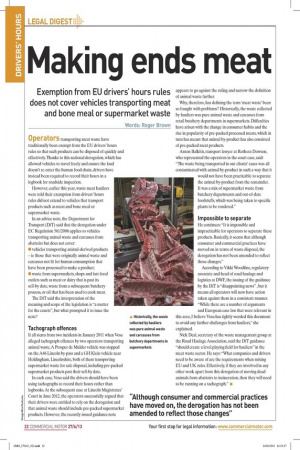Making ends meat Exemption from EU drivers hours rules does
Page 17

If you've noticed an error in this article please click here to report it so we can fix it.
not cover vehicles transporting meat and bone meal or supermarket waste Words: Roger Brown Operators transporting meat waste have traditionally been exempt from the EU drivers' hours rules so that such products can be disposed of quickly and effectively. Thanks to this national derogation, which has allowed vehicles to travel freely and ensure the load doesn't re-enter the human food chain, drivers have instead been required to record their hours in a logbook for roadside inspection.
However, earlier this year, waste meat hauliers were told their exemption from drivers' hours rules did not extend to vehicles that transport products such as meat and bone meal or supermarket waste.
In an advice note, the Department for Transport (DfT) said that the derogation under EC Regulation 561/2006 applies to vehicles transporting animal waste and carcasses from abattoirs but does not cover: • vehicles transporting animal-derived products — ie those that were originally animal waste and carcasses not fit for human consumption that have been processed to make a product; • waste from supermarkets, shops and fast-food outlets such as meat or dairy that is past its sell-by date, waste from a subsequent butchery process, or oil that has been used to cook meat.
The DfT said the interpretation of the meaning and scope of the legislation is "a matter for the courts", but what prompted it to issue the Tachograph offences was pure animal waste It all stems from two incidents in January 2011 when Vosa and carcasses from alleged tachograph offences by two operators transporting butchery departments in animal waste. A Prosper de Mulder vehicle was stopped supermarkets on the A46 Lincoln by-pass and a GH Klein vehicle near Holdingham, Lincolnshire, both of them transporting supermarket waste for safe disposal, including pre-packed supermarket products past their sell-by date.
In each case, Vosa said the drivers should have been using tachographs to record their hours rather than logbooks. At the subsequent case at Lincoln Magistrates' Court in June 2012, the operators successfully argued that their drivers were entitled to rely on the derogation and that animal waste should include pre-packed supermarket products. However, the recently issued guidance note appears to go against the ruling and narrow the definition of animal waste further.
Why, therefore, has defining the term 'meat waste' been so fraught with problems? Historically, the waste collected by hauliers was pure animal waste and carcasses from retail butchery departments in supermarkets. Difficulties have arisen with the change in consumer habits and the rise in popularity of pre-packed processed meats, which in turn has meant that animal by-product has also consisted of pre-packed meat products.
Impossible to separate He continues: "It is impossible and impracticable for operators to separate these products. Basically, it seems that although consumer and commercial practices have moved on in terms of waste disposal, the derogation has not been amended to reflect those changes."
According to Vikki Woodfine, regulatory associate and head of road haulage and logistics at DWF, the issuing of the guidance by the DfT is "disappointing news" , but it means all operators will now have action taken against them in a consistent manner. "While there are a number of arguments and European case law that were relevant in this area, I believe Vosa has tightly worded this document to avoid any further challenges from hauliers," she explained.
Nick Deal, secretary of the waste management group at the Road Haulage Association, said the DfT guidance "should create a level playing field for hauliers" in the meat waste sector. He says: "What companies and drivers need to be aware of are the requirements when mixing EU and UK rules. Effectively, if they are involved in any other work apart from this derogation of moving dead animals from abattoirs to incineration, then they will need to be running on a tachograph." •








































